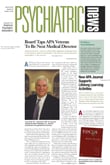Although working as a war correspondent can be extremely dangerous, as the case of Wall Street Journal correspondent Daniel Pearl earlier this year attests, and the physical danger in turn places great stress on the psyche, it appears that no research has been done on the psychological health of war reporters.
So Anthony Feinstein, M.D., Ph.D., an associate professor of psychiatry at the University of Toronto, and his coworkers decided to explore that issue, especially as more and more research is being conducted on the psychological impact of war on soldiers and civilians.
The results of their investigation, which appear in the September American Journal of Psychiatry, are hardly surprising: War correspondents are at high risk for alcohol abuse, major depression, and posttraumatic stress disorder.
First they approached six major news organizations—CNN, BBC, Reuters, CBC, Associated Press, ITN (Independent Television News), and the Rory Peck Trust (an organization representing freelance journalists)—and explained the purpose of their study. All agreed to participate and provided them with the names, work addresses, and e-mail addresses of 170 war correspondents.
These men and women were among the most experienced and respected correspondents. They had been reporting wars, on average, for 15 years. They had been shot at and wounded. They had survived plane crashes. They had lost close colleagues. They had even had bounties placed on their heads and been subjected to mock executions.
Feinstein and his colleagues then sent a questionnaire to each of these correspondents to obtain information about their alcohol and illicit drug use and past and present psychological states. The questionnaire included the 28-item General Health Questionnaire, which contains four subscales, each with seven questions, describing symptoms of somatic complaints, anxiety, social dysfunction, and depression; the Beck Depression Inventory, which contains 21 mood-related questions; and the Impact of Event Scale—Revised, which consists of 22 questions that closely follow DSM-IV criteria for posttraumatic stress disorder.
One journalist was murdered before the questionnaire reached him, thereby reducing the number of potential subjects to 169. Of these, 140 (83 percent) returned completed questionnaires.
Feinstein and his coworkers then approached 134 domestic journalists who were comparable to the war journalists in age, gender, and years of journalistic experience to learn whether they would be willing to serve as controls. One hundred and seven (80 percent) said yes, and each of these journalists filled out the same questionnaire that had been sent to the war journalists.
Then came the second, more challenging phase of the study—personal interviews with 28 (20 percent) of the war journalists. These 28 had been picked randomly, and the interviews took place over a period of several months in cities as far flung as New York, London, Paris, Madrid, Barcelona, and Johannesburg. The interview instrument that was used was the Structured Clinical Interview for Axis I DSM-IV Disorders (SCID). It indicated whether the subjects had ever had a major depression or currently had one, and whether they had ever had posttraumatic stress disorder or currently had it.
Nineteen (18 percent) of the domestic journalists were also randomly selected to take a SCID interview, and these interviews were conducted either face to face or by telephone.
Feinstein and his colleagues then analyzed the results from phase one of the study and compared results for the war correspondents with those for the domestic journalists.
One unit of alcohol was defined as a regular-size bottle of beer, a glass of wine, or a shot of spirits.
The average weekly alcohol consumption levels for the war-correspondents group, 15 units for men and 11 for women, was two and three times those of the domestic journalist group, respectively. With 14 units of alcohol per week considered the upper limit of acceptable drinking for men, 45 war correspondents, compared with only 13 domestic journalists, were drinking excessively—a highly significant difference statistically. The war correspondents also had significantly higher scores on the Beck Depression Inventory, and this difference was confirmed by the scores on the General Health Questionnaire’s depression subscale. As for PTSD symptoms, such as intrusive thoughts and images of traumatic events, 20 war correspondents (16 percent) had them, whereas only nine (10 percent) of the controls did, also a highly significant difference.
The researchers then analyzed the results from phase two of the study and compared results for the war correspondents with those for the controls. Six of the war group (21 percent) had experienced a major depression at some point in their lives, and two of that group (7 percent) currently were experiencing one. In contrast, only one journalist in the control group had ever had a major depression, and it had taken place before he had become a journalist. As for PTSD, eight of the war group (29 percent) had the disorder at some point in their lives, and three (11 percent) currently did. None of the domestic journalists indicated past or current PTSD.
Thus, it appears that war journalists are at high risk for alcohol abuse, major depression, and PTSD, Feinstein and his coworkers concluded. In fact, war journalists’ “lifetime prevalence for posttraumatic stress disorder is similar to that reported for combat veterans,” they pointed out.
These findings, they declared, should “come as a wake-up call to news organizations that all is not necessarily well with the men and women who, at considerable risk, bring us news of the world’s conflicts.”
The study was funded by the Freedom Forum and the Guggenheim Foundation.
